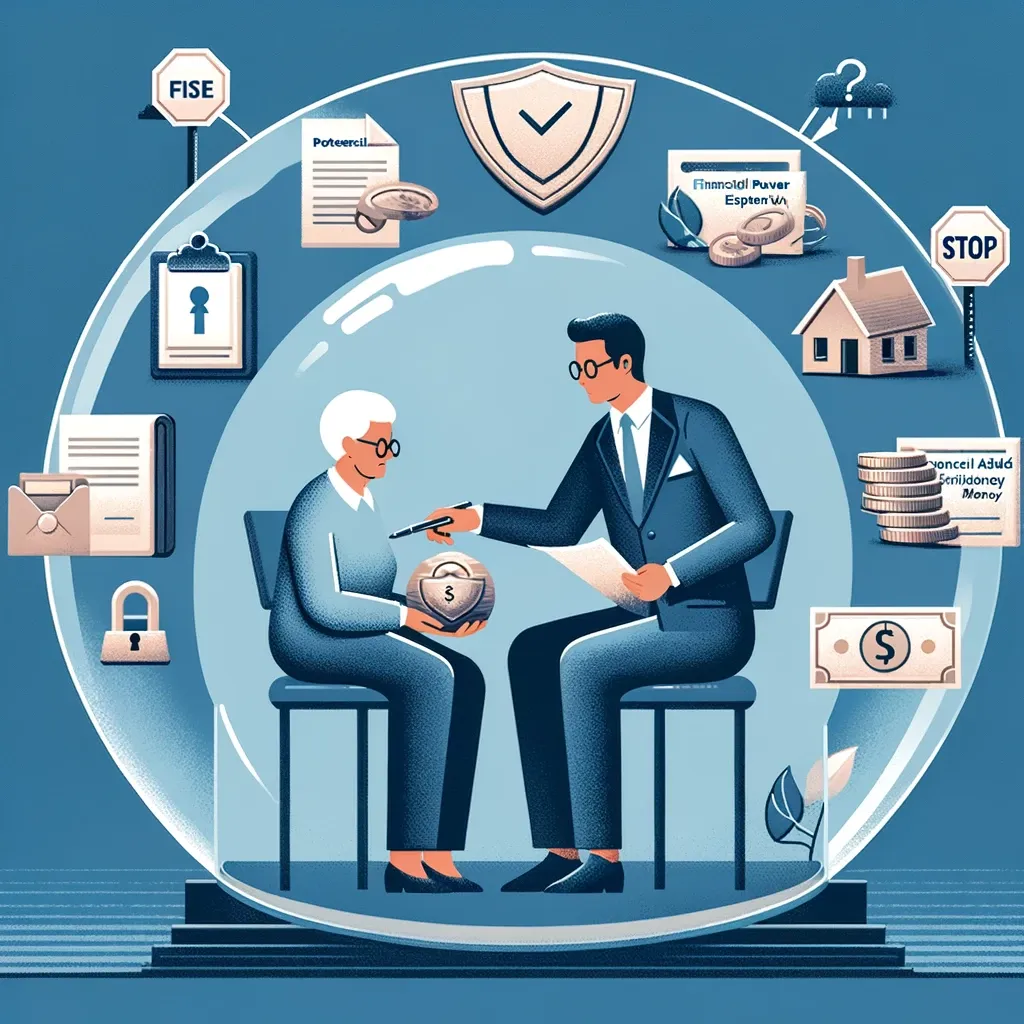Protecting the Elderly from Financial Scams: A Comprehensive Guide
Discover essential strategies to shield seniors from financial scams. Learn about recognizing warning signs, implementing security measures, and engaging support to ensure the safety and well-being of older adults against fraud and exploitation.

How to Protect Elderly From Scams and Fraud
In an era where financial fraud has become alarmingly prevalent, safeguarding the financial wellbeing of older adults has never been more critical. The elderly, with their lifetime of savings and often more trusting nature, have become prime targets for scammers. This comprehensive guide delves into the multifaceted approach required to protect our elders from financial exploitation, focusing on recognizing warning signs, taking preventative measures, and responding effectively to incidents of fraud.
Recognizing the Threat: Understanding Elder Financial Exploitation
Elder financial exploitation encompasses a broad range of fraudulent activities aimed at unlawfully or improperly using an older person's resources for monetary gain. This exploitation can manifest in various forms, including identity theft, scams (such as the notorious grandparent scam), tech support fraud, and even exploitation by family members. The emotional and financial toll on the financially exploited seniors can be devastating, leading to significant financial losses and a deterioration in their quality of life. Seniors do not need to lose money and deal with the emotional effects of the fastest growing form of financial schemes.
Key Strategies for Prevention
Strengthening Financial Defenses
Protecting older adults from financial scams begins with fortifying their financial accounts against unauthorized access. This includes setting up strong passwords, using two-factor authentication, and ensuring that financial documents are stored securely. It's also vital to regularly monitor bank and credit card statements for suspicious activity and to check credit reports annually for signs of identity theft.
Educating on Common Scams: Shielding the Elderly from Financial Predators
In the battle against elder financial exploitation, knowledge serves as the most potent shield. As financial fraudsters evolve in their methods, staying informed about the landscape of scams targeting older adults becomes paramount. This deeper dive into the subject aims to arm seniors and their protectors with the necessary information to thwart potential threats.
The Evolving Landscape of Elder Scams
Financial exploitation of the elderly is a multifaceted problem, with scammers continuously devising new schemes to defraud vulnerable seniors. Among these, certain scams have become notoriously common due to their effectiveness:
- Romance Scam: Exploiting the human need for companionship, fraudsters create fake profiles on dating sites or social media platforms to establish a romantic relationship with elderly individuals, eventually convincing them to send money under false pretenses.
- Tech Support Fraud: Here, scammers pose as tech support representatives from well-known companies, claiming that the senior's computer is infected with a virus. They demand payment for unnecessary software or gain remote access to steal personal and financial information.
- The Grandparent Scam: This emotional manipulation involves the scammer calling an older adult, posing as a grandchild or another family member in distress, urgently needing money for medical bills or legal troubles.
The Rise of AI Voice Generation Scams
A particularly insidious development in elder fraud is the use of artificial intelligence (AI) to clone the voices of loved ones. In these scams, fraudsters use AI voice generation technology to create convincing audio messages from family members or friends, claiming to be in urgent situations where they require immediate financial assistance. The realistic nature of these messages can easily deceive older adults, prompting them to wire money or provide bank account details for online accounts under the guise of helping a loved one.

Warning Signs and Prevention
To protect against these and other scams, older adults and their families must be vigilant for warning signs, such as:
- Unsolicited calls, emails, or messages requesting personal or financial information.
- High-pressure tactics urging immediate action.
- Requests to wire money, send gift cards, or provide bank account information.
Education on these matters is crucial. Government agencies like the Federal Trade Commission (FTC) and the Social Security Administration offer resources other tips and alerts about current scams. The National Elder Fraud Hotline also provides a valuable service for reporting incidents and obtaining advice.
Guarding Against Grandparent Scams: Strategies to Protect Seniors from Sophisticated Fraud Tactics
n the ever-evolving world of financial scams, seniors are increasingly becoming targets of sophisticated and emotionally manipulative schemes. One prevalent example of such deceit involves scammers calling elderly individuals, beginning the conversation with a distressing "Grandma" or "Grandpa." When the concerned senior responds, inadvertently mentioning a grandchild's name, the scammer adopts this identity, claiming to be in jail and in desperate need of bail money. The worried grandparent, driven by a strong desire to help their loved one, may then obtain a money order and send the money to the provided address, only to later discover it was all a scam. This tactic, known as the grandparent scam, preys on the elderly's love and concern for their family members, resulting in significant financial losses and emotional distress.
The creativity and adaptability of these fraudsters are astonishing, as they continually find new ways to exploit vulnerabilities. A striking example of the lengths to which scammers will go is highlighted in a recent incident reported by Ars Technica, where a deepfake scammer executed a first-of-its-kind AI heist, walking away with $25 million.In this sophisticated scam, fraudsters used artificial intelligence to mimic the voice of a trusted individual, convincing the victim to transfer vast sums of money under false pretenses. This incident underscores the critical importance of staying informed and vigilant against the ever-more creative tactics employed by con artists.
To combat these and other scams, seniors and their families must adopt proactive measures to protect themselves. This includes verifying the legitimacy of distress calls through direct contact with other family members, being wary of unsolicited requests for money, and reporting any suspicious activity to authorities such as the Federal Trade Commission, the Social Security Administration, or the National Elder Fraud Hotline. Financial institutions also play a crucial role in detecting and preventing elder financial exploitation by flagging unusual transactions and educating customers about the warning signs of fraud.
Additionally, setting up safeguards such as strong passwords for online accounts, monitoring credit reports through credit bureaus, and establishing a passcode system within the family can further enhance protection against financial abuse. By taking these steps, older adults and their caregivers can significantly reduce the risk of falling victim to scams, ensuring their financial well-being and peace of mind in their golden years.
Implementing a Passcode System: A Simple Strategy to Shield Seniors from Scams and Financial Exploitation
In the complex landscape of elder financial exploitation, safeguarding the well-being and assets of older adults demands innovative and practical strategies. One such measure is the establishment of a passcode system between seniors, their family members, and caregivers. This system serves as a private verification method to confirm the legitimacy of phone calls and requests for sensitive information or financial assistance. In an era where scams and fraudulent schemes target older adults are increasingly sophisticated, utilizing a pre-arranged, secret code can instantly alert an older adult whether a request is genuine or a potential scam.

A simple and effective tool to protect seniors
This simple yet effective tool can be especially critical in protecting against identity theft, grandparent scams, and other forms of elder fraud where con artists might impersonate family members or trusted officials from government agencies like the Social Security Administration or the Federal Trade Commission.
Implementing such a precautionary measure reinforces the protective barrier around financial accounts and personal information, significantly reducing the risk of financial abuse. It empowers older adults and their support networks to make informed financial decisions, fostering a sense of security and trust within these interactions. Additionally, it encourages regular communication and planning between elderly parents and their adult children or caregivers, ensuring that all parties are informed and vigilant against the myriad forms of scams targeting older populations. By adopting this and other protective strategies, families can create a more resilient defense against the financial exploitation of their loved ones, ensuring their hard-earned assets are shielded from the unscrupulous tactics of fraudsters and scammers.
Strengthening the Shield: The Critical Role of Financial Institutions in Protecting the Elderly from Scams
Financial institutions and professionals are on the front lines of the battle against elder financial exploitation. With the increasing prevalence of financial fraud targeting older adults, the responsibility of these entities to safeguard their clients' assets has never been more significant. Through the implementation of advanced detection systems, comprehensive staff training, and a commitment to customer education, banks and financial professionals can play a pivotal role in preventing financial abuse among the elderly.
Advanced Detection Systems
Financial institutions are increasingly leveraging technology to identify and prevent fraudulent activity. Systems designed to flag unusual transactions, such as atypical large withdrawals, frequent wire transfers, or irregular account activities that deviate from a customer's normal pattern, serve as early warning systems for potential fraud. These technologies enable banks to take immediate action, such as freezing accounts or contacting the account holder to verify transaction legitimacy, thereby preventing potential losses.
Staff Training and Vigilance
The human element is equally crucial in detecting and preventing elder fraud. Financial professionals, from tellers to account managers, are often the first to notice red flags that may indicate exploitation. Training staff to recognize the signs of elder financial abuse—such as a client appearing confused, stressed, or accompanied by a pushy caregiver or other family members or member making unusual transaction requests—is essential. Employees should be empowered to report these signs to their superiors or dedicated fraud prevention teams within the institution, who can then take appropriate measures to investigate and protect the customer.
Collaboration with Government Agencies and Hotlines
Financial institutions also collaborate with government agencies, such as the Social Security Administration and the Federal Trade Commission, to report and combat elder financial exploitation. By working closely with these agencies, banks can find local resources and contribute to broader efforts to track and shut down fraudulent operations targeting older adults. Additionally, financial institutions can guide customers and their families to resources like the National Elder Fraud Hotline for reporting financial abuse and obtaining assistance.
Customer Education Programs
Educating older adults about the risks of financial scams and how to protect themselves is another vital strategy. Many banks offer workshops, seminars, and online resources aimed at empowering their elderly clients with the knowledge to recognize common scams, such as tech support fraud, romance scams, and phishing attempts. By informing customers about the importance of safeguarding personal and financial information and how to verify the legitimacy of requests for money, financial institutions can build their clients' resilience against scams.
Supporting Elderly Clients in Making Financial Decisions
Financial professionals can provide invaluable guidance to older adults making significant financial decisions, helping them avoid scams and exploitation. Advising clients on the dangers of wiring money to unknown recipients, the importance of consulting with trusted family members before making large transactions, and the benefits of setting up financial powers of attorney are all part of the proactive measures that can protect elderly clients from financial harm.

A Collective Effort Toward Elder Protection
The role of financial institutions and professionals in protecting older adults from scams and financial exploitation is multifaceted and essential. Through the use of advanced detection systems, vigilant staff training, active collaboration with government bodies and other resources, and comprehensive customer education programs, these entities can significantly mitigate the risk of financial abuse among the elderly. As guardians of their clients' financial well-being, banks and financial professionals are indispensable allies in the ongoing effort to shield our most vulnerable population from the scourge of financial fraud.
Empowering Older Adults
Empowering seniors to protect themselves involves several strategies:
- Encouraging skepticism towards unsolicited requests for money or personal information.
- Educating them on the importance of strong, unique passwords for financial accounts and online profiles.
- Advising on the utility of secure banking practices, such as setting up transaction alerts and verifying the legitimacy of requests through direct, trusted channels.
A United Front Against Elder Fraud
Protecting older adults from scams and financial exploitation is a collective endeavor that necessitates awareness, education, and proactive measures from individuals, families, financial institutions, and government agencies. By staying informed about the types of frauds seniors face today, including sophisticated AI voice generation scams, and by fostering an environment of open communication and support, we can significantly reduce the risk of financial harm to our elderly population. Together, we can shield our aging parents and loved ones from the financial predators lurking in the shadows, ensuring their security and well-being in their golden years.
Utilizing Technology Wisely
Technology can be a double-edged sword. While it offers conveniences like online banking, it also opens up avenues for online scams. Teaching older adults to be skeptical of unsolicited calls, emails, and text messages, and to never share personal information online, is crucial. Installing reputable antivirus software and using secure networks can also further protect older adults against online fraud.
The Role of Family Members and Caregivers
Family members and caregivers play a pivotal role in safeguarding the financial wellbeing of older adults. This includes:
- Monitoring for Warning Signs: Keeping an eye out for unusual financial behavior, such as sudden large withdrawals or unexplained transactions, can help detect exploitation early.
- Encouraging Open Communication: Creating an environment where older adults feel comfortable discussing their finances and any concerns they might have is essential.
- Assisting with Financial Management: For those in cognitive decline or who feel overwhelmed by technology, family members can help manage financial accounts and monitor for fraudulent activity.

Report Fraud and Responding to Elder Financial Schemes
In instances of suspected financial abuse, immediate action is necessary. This involves:
- Reporting to Authorities: Contacting local law enforcement and reporting to the Federal Trade Commission or the Social Security Administration can help initiate an investigation into the fraud.
- Utilizing Resources: The National Elder Fraud Hotline provides a crucial service for reporting financial abuse and finding local resources to assist victims.
- Engaging Financial Institutions: Informing banks and financial institutions about the fraud can help in recovering lost funds and securing accounts against further unauthorized access.
Legal Measures and Resources
Taking legal measures, such as granting a trusted family member power of attorney, can provide an additional layer of protection against financial exploitation. Additionally, consulting with financial professionals and utilizing resources from government agencies and elder protection organizations can offer guidance gather information and support in preventing and responding to financial abuse.
The Importance of Community Awareness
Raising awareness within communities about the prevalence and signs of both elder abuse and financial exploitation is critical. This can involve organizing informational sessions in living communities, nursing homes, and local community centers. Educating the public on how to report suspicious activity and where to find help can create a more vigilant and supportive environment for older adults.
A Collective Effort to Protect Seniors
Protecting the elderly from financial scams and exploitation is a collective effort that requires the involvement of family members, caregivers, financial institutions, government agency and the wider community. By staying informed, vigilant, and supportive, we can help ensure that older adults live their golden years with the financial security and peace of mind they deserve. It's not just about preventing financial loss; it's about preserving the dignity and wellbeing of our aging loved ones.
You might also like this article:


